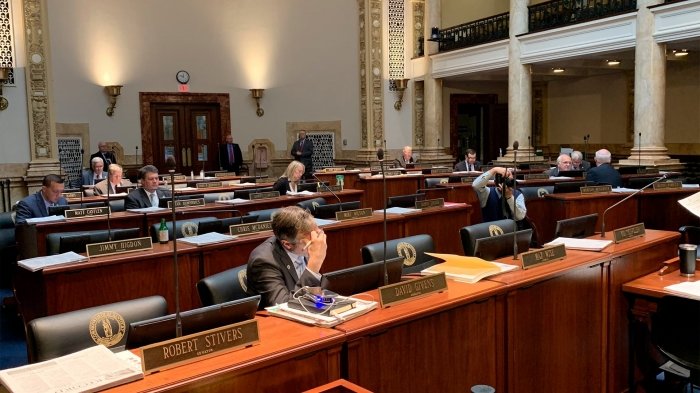L
ed by the Kentucky Center for Economic Policy, a coalition of 17 groups is calling on Kentucky lawmakers who are expected to unveil a new bill to make HHR machines legal to ensure historical horse racing is taxed at a higher rate.
The coalition argues HHR machines are currently taxed at a much lower rate than slot machines in other states and other legal forms of gambling in Kentucky, losing out on the potential to increase the state’s annual tax revenue by $91 million, the Courier-Journal reports.
The proposed legislation follows a unanimous Kentucky Supreme Court decision in September ruling they do not constitute legal “pari-mutuel” wagering under current law.
The details on the new bill have not been made public, but horse racing industry advocates believe track-owned “racinos” can stay open legally if a bill changes the statutory definition of pari-mutuel wagering to allow HHR machines.
Gambling opponents like the Family Foundation of Kentucky — who sued to stop HHR machines nearly a decade ago — counter that the only way to make HHR machines legal is to amend the state constitution, which could only go into effect no earlier than late 2022 after a statewide voter referendum.
In the open letter sent to state legislators Monday, the coalition called the HHR machines “vastly under taxed” in Kentucky at 1.5% of the total handle wagered, or 18% of the gross commission after winnings are paid out — with 10% going back to the horse racing industry to support increased purses and 8% going to the state’s General Fund.
In comparison, the coalition cites surrounding states having a tax rate on gross commission from slot machines ranging from 33% to 55%.
Kentucky’s tax rate on the total handle for live horse racing is more than double HHR at 3.5%, while 70% of gross commission from the Kentucky Lottery goes to the state’s budget — nearly nine times higher than the 8% for HHR machines.
In the letter, the coalition argued that legalizing HHR “but failing to adequately tax it will continue to shortchange schools, health care, infrastructure and other vital services while giving the green light to further expand this rapidly-growing form of gambling across the commonwealth.”
The coalition adds HHR betting has grown dramatically in recent years to the point that it exceeded $2 billion in 2020 — more than Lottery and horse racing combined — and could surpass $3 billion this year if facilities are allowed to stay open.
According to its fiscal analysis of a bill prefiled last year, the Kentucky Legislative Research Commission estimates a 2% surtax on HHR betting — matching the 3.5% rate on live horse betting — would net approximately $91 million in new tax revenue for the state in the 2022 fiscal year, assuming track facilities stay open and continue planned expansions.
The coalition says if legislators widen the definition of pari-mutuel wagering while failing to increase the rate it is taxed, they will “allow the continued proliferation and growth of casino-type gambling throughout the commonwealth without the associated benefit to Kentucky’s budget,” all while “the associated social costs” of gambling increase.
A similar argument was made by Family Foundation attorney Stan Cave in a Frankfort committee meeting in December, who called the horse industry’s $717 million in revenue from HHR compared to the $52 million in tax revenue received by the state “the greatest ripoff in the history of the state of Kentucky.”
Horse industry officials have countered that without a quick legislative fix to keep racinos open, one of Kentucky’s signature industries will suffer massive job losses, from tracks to farms.
“Without HHR, we will see a mass exodus of horses from our racetracks and farms alike,” said Kentucky Thoroughbred Association President Braxton Lynch in the December meeting. “It would mean empty barns, empty fields, empty jobs and less tax revenue. The existence of Turfway Park and winter racing in Kentucky would be at risk.”
Keeneland’s Red Mile HHR facility in Lexington recently shut down in response to the Kentucky Supreme Court’s refusal to rehear the case, with the general manager of Ellis Park saying last week his Henderson track would have to close without HHR revenues.
In addition to the Kentucky Center for Economic Policy, the 17-member coalition for increased taxes on HHR facilities includes: the 874K Disabilities Coalition; AFSCME Indiana – Kentucky Council 962; Bluegrass Activist Alliance; Forward Kentucky; Homeless and Housing Coalition of Kentucky; Jefferson County Teachers Association; Kentucky Coalition Against Domestic Violence; Kentucky Education Association;
Kentucky Equal Justice Center; Kentucky Government Retirees; Kentucky Mental Health Coalition; Kentucky Voices for Health; Mental Health America of Kentucky; NAACP Owensboro; National Association of Social Workers – Kentucky; Progress Kentucky.



